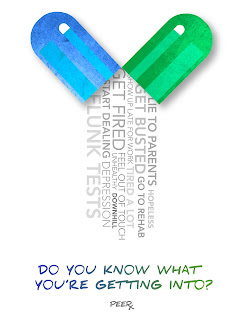There isn’t a minimum age restriction on developing an addiction, many people’s struggle with the debilitating mental illness starts in adolescence. While we don’t treat minors at Hope By The Sea, we have a vested interest in advocating for drug and alcohol use prevention. Problems people face in adulthood, in many cases, begin in high school; use disorders can develop right under the nose of parents, and many young people do not view their behaviors as problematic.
High school is a difficult time for everyone, even those who have the benefit of popularity. What is going on just beneath the surface isn’t always apparent. It’s not rare for people who have unhealthy relationships with drugs and alcohol to eke out straight A’s still. The point is that identifying who is struggling with substance use isn’t always so easy. Even when there appears to a problem, it’s not hard for people to chock it up to teenage rebellion—behaviors that an individual will shake off down the road.

There are teenagers who know that their behavior is likely going to lead to problems, i.e., dependence; however, the majority of young people who develop substance use disorders do not understand how much is at stake. It’s absolutely vital that adolescents have all the facts before they begin down a slippery slope toward addiction.
National Drug and Alcohol Facts Week
The National Institutes of Health (NIH) and its subsidiaries, such as the National Institute on Drug Abuse (NIDA) and the National Institute on Alcohol Abuse and Alcoholism (NIAAA), are committed to providing teenagers and young adults with information about alcohol and substance use. Drug and alcohol use prevention is a year-round endeavor, but this week such efforts shift into high gear.
National Drug and Alcohol Facts Week (Monday, January 22nd through Sunday, January 28th) is a health observance week for teens that aims to SHATTER THE MYTHS® about drug and alcohol use. Throughout the United States, events are taking place daily to educate young people about the risks of using mind-altering substances. Please take a moment to watch a short video of the heads of NIAAA and NIDA, Dr. George Koob and Dr. Nora Volkow:
If you are having trouble watching, please click here.
Agencies like NIDA, are fully aware that young people have a significant number of misconceptions about alcohol, tobacco, and marijuana; such substances are often precursors to progressing to “harder” drugs. For instance: teens are inclined to think pot is safe because it is socially accepted and legal in various states. While cannabis is undoubtedly less harmful than say, heroin, the drug is habit forming and can lead to addiction. It’s vital that everyone has scientific facts before they choose to experiment.
If you would like to attend an NDAFW event in your state, please click here.
Addiction Treatment
If your substance use during adolescence led to addiction in adulthood, you are not alone—help is available. The sooner you seek assistance for an alcohol or substance use disorder, the better. Please contact Hope By The Sea to begin a life-saving journey of recovery.

